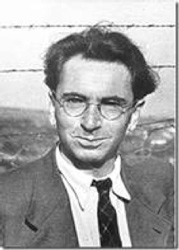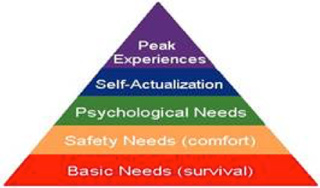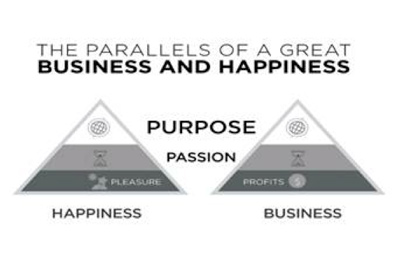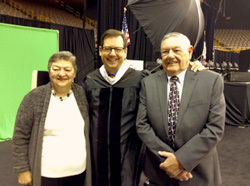Okinawans call it ikigai, and Nicoyans call it plan de vida, but in both cultures the phrase essentially translates to 'why I wake up in the morning.'
– Dan Buettner

Victor Frankl writes: "Success, like happiness, cannot be pursued; it must ensue...as the unintended side-effect of one's personal dedication to a course greater than oneself.”
Viktor’s great insight was formed in the winter of 1942, when as a young psychiatrist, he and his wife, Tilly, were among the hundreds of Jews rounded up and arrested in Vienna. At the time, Viktor was already hard at work on a theory of psychological well-being. Anticipating the roundup, the young couple took great pains to save their most cherished possession – the manuscript Viktor was writing. Before the officials marched into their home, Tilly sewed the document into the lining of Viktor’s coat. Viktor wore that coat when the couple was later dispatched to Auschwitz, but on his second day in the concentration camp, he was stripped by the SS guards, and never saw the manuscript again.

In the ensuing three years, at Auschwitz and later at Dachau – as his brother, mother, father, and pregnant wife all perished in the gas ovens – Viktor worked to recreate the text by scratching notes on stolen scraps of paper. And in 1946, one year after Allied forces liberated the concentration camps, those crumpled pieces were transformed into what would become one of the most powerful and enduring books of the last century, “Man’s Search for Meaning.” Within those pages, Viktor argued that, “Man’s main concern is not to gain pleasure or to avoid pain but rather to see a meaning in his life.”
When we are no longer able to change a situation, we are challenged to change ourselves.

(Excerpt) Man's Search for Meaning/Viktor Frank
Read here

My search to answer the "eternal questions" in the film, The Search for Meaning
Watch here

Do you ask yourself the “eternal questions”—or do you avoid them? What gives your life meaning?
 In 1968, at the University of Kansas, Senator Robert F. Kennedy gave one of the most beautiful and courageous speeches in American political history. Few Americans remember now what he said, so I’d like to share with you a short excerpt here
In 1968, at the University of Kansas, Senator Robert F. Kennedy gave one of the most beautiful and courageous speeches in American political history. Few Americans remember now what he said, so I’d like to share with you a short excerpt here
 Abraham Maslow's Hierarchy of Needs - Many of you are familiar with Abraham Maslow's hierarchy of needs: Often portrayed in the shape of a pyramid, with the largest and most fundamental levels of needs at the bottom, and the need for self-actualization at the top.
Abraham Maslow's Hierarchy of Needs - Many of you are familiar with Abraham Maslow's hierarchy of needs: Often portrayed in the shape of a pyramid, with the largest and most fundamental levels of needs at the bottom, and the need for self-actualization at the top.
Interestingly, later in life Maslow wanted to take this hierarchy for the individual and apply it to the collective, to organizations and specifically to business. But unfortunately, he died prematurely in 1970.
The idea has never the less taken hold in some of the most innovative companies. One example is Zappos. Zappos’ CEO, Tony Hsieh has drawn the parallel between business and happiness, and integrated it into the culture of his company.
 "So many people when they go to the office, they leave a little bit of themselves at home, or a lot of themselves at home," he says. "And while there’s been a lot of talk over the years about work life separation or work life balance, our whole thing is about work life integration. Because it’s just life – and the ideal would be if you can be the same person at home as you are in the office and vice versa." - Zappos’ CEO, Tony Hsieh
"So many people when they go to the office, they leave a little bit of themselves at home, or a lot of themselves at home," he says. "And while there’s been a lot of talk over the years about work life separation or work life balance, our whole thing is about work life integration. Because it’s just life – and the ideal would be if you can be the same person at home as you are in the office and vice versa." - Zappos’ CEO, Tony Hsieh
The company’s annually published Culture Book contains hundreds of short essays written by Zappos employees and vendors explaining what makes the culture so special and successful. Says Hsieh: "Corporate culture is every bit as important as the bottom line."
Martin Seligman (University of Pennsylvania), has identified three different happy lives that correspond to these three desires:

Can happiness be taught? Martin E. P. Seligman
Read here

A Dream Job – (Iowa Alumni Magazine)
Read here
 A parting shot of my own – I would like to extend my deep gratitude to the University of Iowa College of Liberal Arts & Sciences for the honor of participating in the spring commencement ceremony (May 17, 2014 at Carver Hawkeye Arena). You can watch it here.
A parting shot of my own – I would like to extend my deep gratitude to the University of Iowa College of Liberal Arts & Sciences for the honor of participating in the spring commencement ceremony (May 17, 2014 at Carver Hawkeye Arena). You can watch it here.
The following is the text of my commencement address. >(https://db.tt/ngNcnTkm) I am particularly pleased that my parents were in attendance. We are given few chances to publicly thank the people who impact our lives and I was grateful for the opportunity.

"What if money was no object?" is our closing video of the semester.
Watch here

Gratitude really works. In fact according to Martin Seligman, feelings of appreciation enhance well-being and deepen one’s sense of meaning. In that spirit, think of a person in your life who has been kind or generous to you, but whom you’ve never properly thanked. Write a detailed “gratitude letter” to that person explaining in concrete terms why you’re grateful and mail it! (Don’t forget to give me a copy as well.)

INSTRUCTIONS: Drawing from the videos, journal assignments, and exercises, describe what resonated most with you, and how you see your life moving forward.
(Minimum Length: Three Pages) Deposit on ICON
Here you'll find some of my musings that I think will help support the narrative, and provide some additional information. Check it out here
